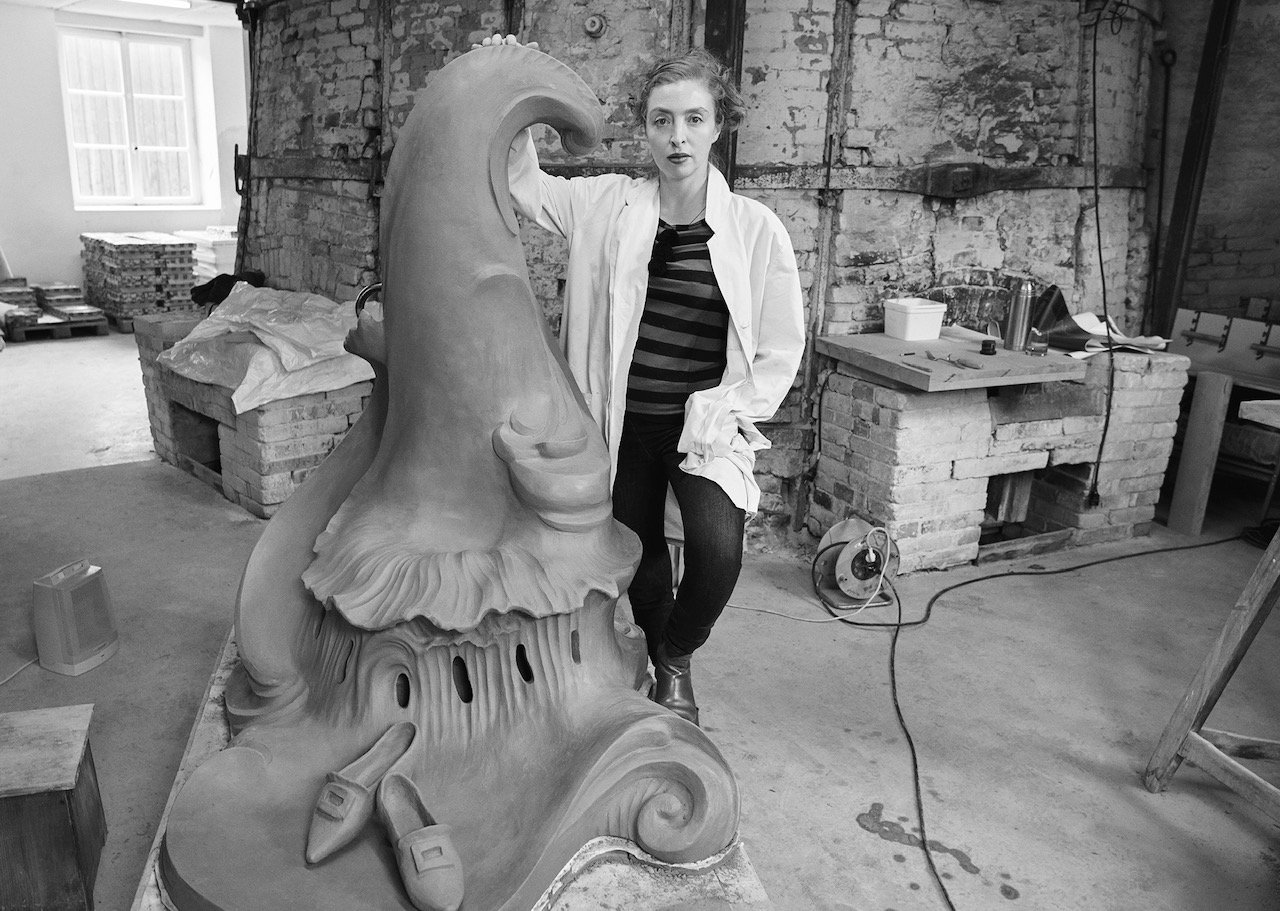
Fairy tales, religion, and the decadence of centuries past all blend together in American artist Rachel Feinstein’s darkly beautiful paintings and sculptures. Her creations can feel like stepping into a storybook world—which made us wonder how she celebrates this most magical time of the year.
The lead-up to the holiday season has been busy for Feinstein. She is preparing to open a new exhibition at Gagosian London in January, featuring paintings inspired by her current fascination: the 16th-century German artist Tilman Riemenschneider’s wood sculptures. Over the next few weeks, however, Feinstein will be hosting some intimate and festive holiday gatherings at the New York City home she shares with her husband, the artist John Currin, including a Christmas Eve meal with their nearest and dearest.
Recently we chatted with Feinstein about how she likes to entertain during the holidays, the meals that conjure fond memories, and even the Christmas ornaments she most adores.
Rachel Feinstein and John Currin.
How do you generally like to spend this time of year? Do you typically take a holiday?
Growing up, my family celebrated both Hanukkah and Christmas because my mother was raised as a Catholic and my father as a Jew. So that means I’m still a bit confused about how to celebrate the holidays, but I love decorating the Christmas tree with my children and having a glass of eggnog while holiday music plays. We prefer to stay home in New York City for the holidays and usually have friends over for Christmas Eve dinner.
Do you usually see family and friends more at this time of year? Are there any traditions you celebrate or partake in together?
Old friends, family, and good food are very important to me. I love eating Tobias Meyer’s Christmas goose with red cabbage and napkin potato dumplings over the holidays. And I love to make handmade Sculpey Christmas ornaments with my children, and fellow artists Sean and Kevin Landers, Richard Phillips, Lisa Yuskavage, and Matvey Levenstein.
What are some holiday traditions you grew up with, or things you’ve always enjoyed doing during this time of year?
My family didn’t do any special type of celebration, and usually didn’t even exchange gifts. I wish I could get away with no gifts now, it would make my life way easier!
Readers at the moment are likely thinking about how they’ll spend the season, which will ideally include a few intimate gatherings, whether virtual or in-person. Do you enjoy entertaining and if so, what in your view makes a good party?
I enjoy organizing small dinner parties, usually 12 people or less around an oval or round table where everyone can talk. I love to kick the evening off in my living room with oysters, good cocktails, and a roaring fire.
What is your favorite thing to make when you have people over?
On an average weekend night, I love to make pasta for my family and friends. I make a pretty good rendition of Bar Pitti’s Rigatoni Pitti. For Christmas Eve, I like to make a duck, turkey, or ham with scalloped potatoes, green beans, candied carrots, and pumpkin cheesecake for dessert.
Do you have any tips for holiday parties or gatherings?
Start the evening by offering strong and fancy cocktails, like a negroni or martini—it always makes the party more fun.
What about tips for keeping conversations interesting?
I like to make a seating chart a couple of days beforehand so I can mull it over. I try to seat people next to each other who have something in common, but perhaps are meeting for the first time. I like to play matchmaker and see how my instincts work out.
What does this time of year look like for you, as an artist? What are you looking forward to?
I have a couple of projects coming up that I’m excited about! I’ll be showing new work for the first time since the lockdown, which is both frightening and exhilarating.
I wanted to recreate the emotional charge of Crucifixion, a work that I made after 9/11. In the wake of that event, I found solace in Old Master works of Jesus and Mary feeling their own pain, particularly Matthias Grünewald’s Deposition paintings. Now, during lockdown, I’ve been inspired by 16th-century wood sculptor Tilman Riemenschneider’s sculptures of Jesus, the Virgin, and the Last Supper. I’m undergoing Jungian dream analysis and am interested in using the iconography of suffering to express our present uncertainties. I’ll be showing new mirror paintings influenced by Riemenschneider in my exhibition at Gagosian in London on Davies Street, opening on January 20 of next year.
Rachel Feinstein, The Assumption (2021). © Rachel Feinstein. Photo: Rob McKeever. Courtesy of Gagosian.
Right now, I’m also showing a banner at the Met Opera in conjunction with Laurent Pelly’s staging of Cinderella. I used an image of Mary Magdalene from Gregor Erhart, another great 16th-century German wood sculptor, as the model for Cinderella. It was through my therapy that I came to understand why—Magdalene is always shown with very long hair because she used it to wash Jesus’s feet when he was taken down from the cross, and Cinderella is identified by her foot, through the glass slipper. I love that unconscious connection.
What comes to mind when you think of next year?
I’ve always been interested in fairy tales, history, and religion. Now I want to weave these topics with the guiding principle of my dreams and the unconscious, so my work becomes deeper and more mysterious. I want to literally create the chasm that you would see within the Virgin’s cloaks. As I’ve just hit 50, I am very aware of time and what the next era will bring.